

Uh oh...
It appears that you're using a severely outdated version of Safari on Windows. Many features won't work correctly, and functionality can't be guaranteed. Please try viewing this website in Edge, Mozilla, Chrome, or another modern browser. Sorry for any inconvenience this may have caused!
Read More about this safari issue.

In February of 2022, Caroline and Aaron Hopper received the news no parents ever want to hear. Their four-year-old daughter Grace had leukemia. The next year and a half brought many appointments with doctors, specialists and visits to the oncology clinic at Arkansas Children’s Northwest in Springdale. Throughout the ordeal, Grace was showered with love and gifts, many of those toys, and brought joy to everyone around her. In fact, she received so many toys from friends that her mother started passing them back to the hospital to be given to other kids facing cancer. However, Caroline noticed there wasn’t a toy closet at their oncology clinic at Arkansas Children’s Northwest, where Grace had appointments at least once a week.
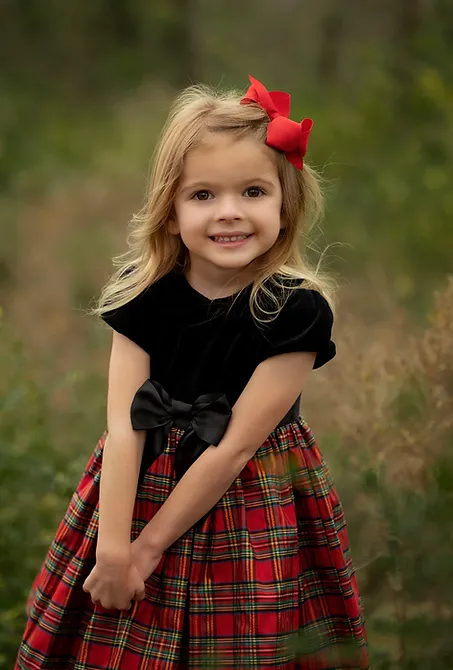
“It wasn’t a big deal for us. Grace had plenty of toys, but I wondered about kids who didn’t,” Caroline says. When a child receives a cancer diagnosis at Arkansas Children’s in Little Rock or Arkansas Children’s Northwest in Springdale, they’re scheduled for the oncology clinic, where treatment happens according to the type of diagnosis. Grace had T-Cell Acute Lymphoblastic Leukemia (T-ALL). This is the most common type of childhood cancer, with most children diagnosed between two and ten years old. It is an aggressive cancer that originates in the bone marrow but can spread to other organs if left untreated.
Despite T-ALL’s aggressiveness, it can be treated and has a 90% survival rate. The treatment involves immediate chemotherapy to bring the cancer cells in the body down to 0%, followed by a bone marrow transplant from a matching donor. Many children go into remission within weeks of receiving treatment and are considered completely cured of leukemia after 10 years of remission.
Still, the chemotherapy sessions are difficult. Patients receive a chemotherapy port implanted in the skin, where chemotherapy drugs can be administered directly into the port. Once installed, the patient attends oncology clinic appointments to receive infusions. The port may also need to be accessed for blood draws, or the patient could need fluids or blood products. “Port access is very hard on parents and patients,” Caroline says. The nurses on hand at Arkansas Children’s Northwest work hard to make chemotherapy less traumatic.
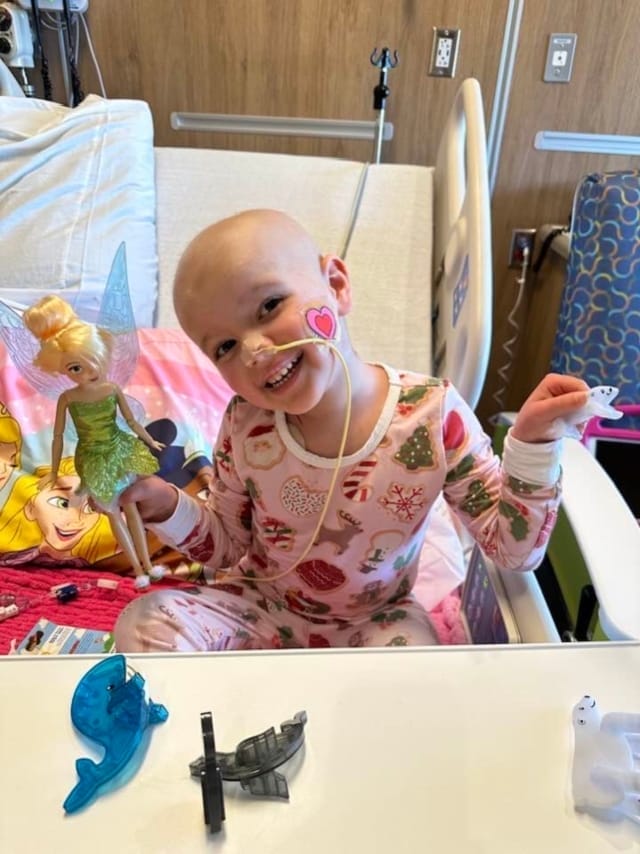
Unfortunately, Grace didn’t respond well to the chemotherapy treatments. After one month of treatments, she still had 42% of the cancer cells in her body, at which point many pediatric leukemia patients are down to zero. When Grace was first diagnosed, the medical team also identified a genetic mutation called an MLL gene rearrangement. This is a known genetic change that affects eight percent of pediatric leukemia patients, but it is less common in T-ALL patients. This diagnosis didn’t affect Grace’s treatment at first, but after exhausting options at Arkansas Children’s Health, Grace was accepted into a clinical trial in Kansas City designed for cancer patients with the MLL genetic defect. The trial used a new drug that showed promising results for patients with this particular genetic change.
In the spring of 2023, Grace got the chance to visit Disney World with her family and meet Disney princesses while enjoying the Magic Kingdom. Her cancer cells had dropped to 1.5%, but it still wasn’t low enough for the bone marrow transplant. Her medical team continued to work hard, and Grace continued to face each appointment bravely. “Grace had such a spirit about her,” Caroline says. “Sometimes, it was hard to know how sick she was. She made everyone fall in love with her.”

In June, Grace’s numbers began rising, and she was flown to Arkansas Children’s Hospital in Little Rock. Unfortunately, the cancer in her blood was too much for her to overcome. Grace Hopper died June 8, 2023, after fighting cancer for 16 months. In the weeks that followed, Caroline reflected on the many toys Grace received while she was sick and the happiness it brought her. She thought about the tough days at the oncology clinic. That July, Caroline’s younger daughter turned two. The family already had so many toys that they decided to ask for new toys to donate to the oncology clinic at Arkansas Children’s Northwest. When Grace’s birthday arrived in August, the family chose to remember her by asking for more toys to donate. The idea for Grace’s Toy Closet was born.
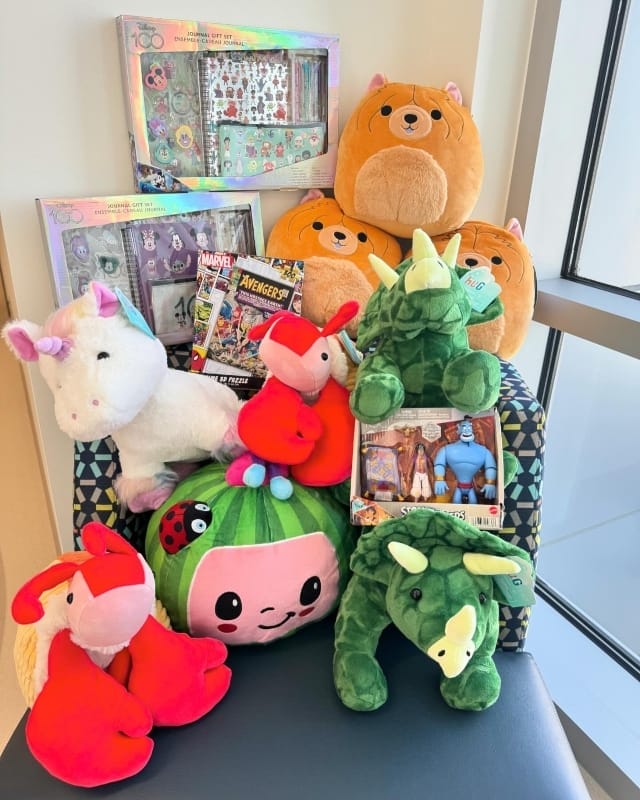
Caroline had a friend with previous experience in 501(c)3 organizations who helped her file the paperwork with the Arkansas Secretary of State to create Grace’s Toy Closet officially. The organization focuses on donating toys specifically to the oncology department at Arkansas Children’s Northwest in Springdale, where children are undergoing cancer treatment. Caroline stays in contact with the team that helped Grace, especially Dr. Cristyn Branstetter and specialty nurse Alex Craig. “The toy closet would not be as successful as it is now if it were not for them,” Caroline says. The nurses at the oncology clinic are also key to the toy closet’s success. They work directly with pediatric patients. “The nurses know these kids so well. It’s a long journey. The nurses decide what toy they think the kids will like,” Caroline says.
Since starting Grace’s Toy Closet, they have received over one thousand toys. “At Christmas, we had a big push to give everyone an Advent calendar,” Caroline says. Caroline has received cards of gratitude from both the oncology nurses and mothers of the cancer patients. The nurses often say, “I wish you could see the kids’ faces,” each time they give out toys. Every time a child visits the clinic, whether it is the first time or the twentieth time, they receive a toy.
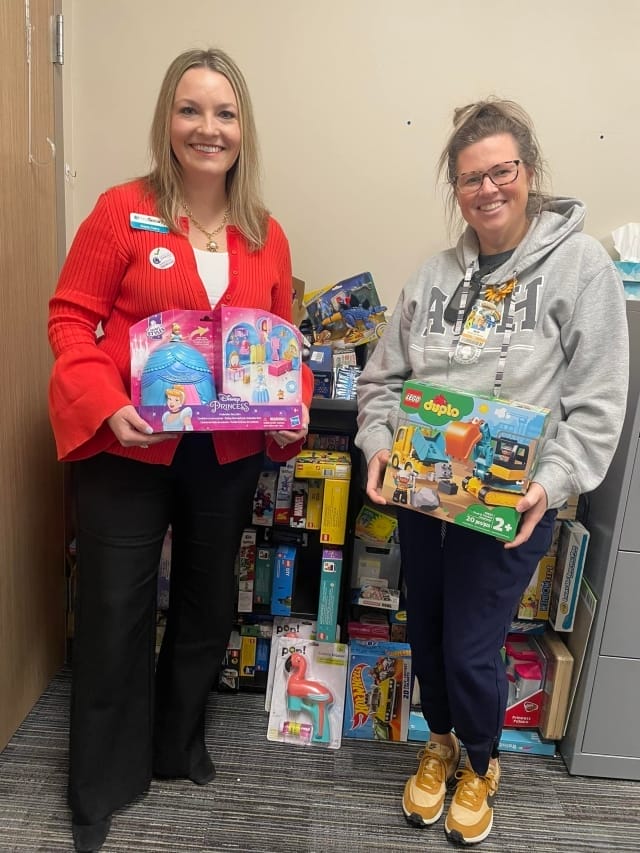
“Providing toys for these moments is important,” Caroline says. “Facing childhood cancer is a challenge for the patient and the parents. It’s financially stressful. One parent really can’t work that much. You’re a mom and a nurse. I’m grateful for the years I had with Grace. There were a lot of amazing things we saw through Grace’s cancer fight because she was simply amazing.”
If you want to donate to Grace’s Toy Closet, Caroline encourages financial or gift card donations to the non-profit organization. She currently does all of the shopping and often finds discounts to stretch donations or toys for a specific patient. To learn more about how to donate or about Grace’s Toy Closet, visit the website Grace’s Toy Closet or the Facebook page Grace’s Toy Closet.
Toys can’t change the cancer diagnosis, but they make the treatment more bearable. Grace’s Toy Closet continues to honor Grace’s life and bring a little more joy into the world of child cancer patients at Arkansas Children’s Northwest.
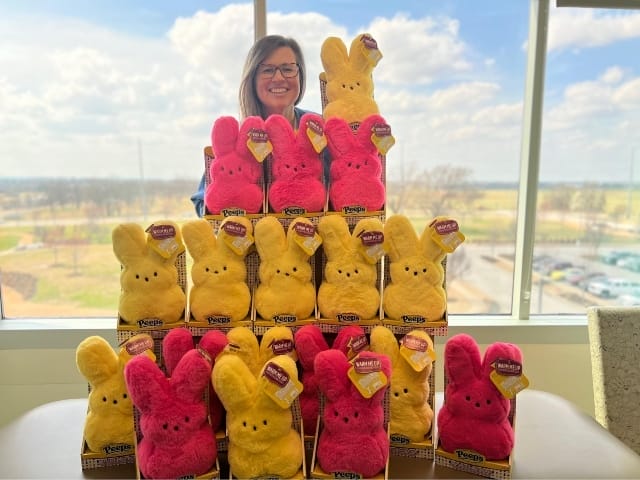
All photos are courtesy of Grace’s Toy Closet and Caroline Hopper and used with permission.
We do the work.
You check your email.
Sign up for our weekly e-news.
Get stories sent straight to your inbox!









Like this story? Read more from Kimberly Mitchell
When Sylvanus Blackburn first laid eyes on War Eagle Valley in 1832, he...
Adding a pet to the family is a special day for many Arkansans. Pet...
When the first settler arrived in northern Arkansas around 1810 and found...
Join the Conversation
Leave a Comment